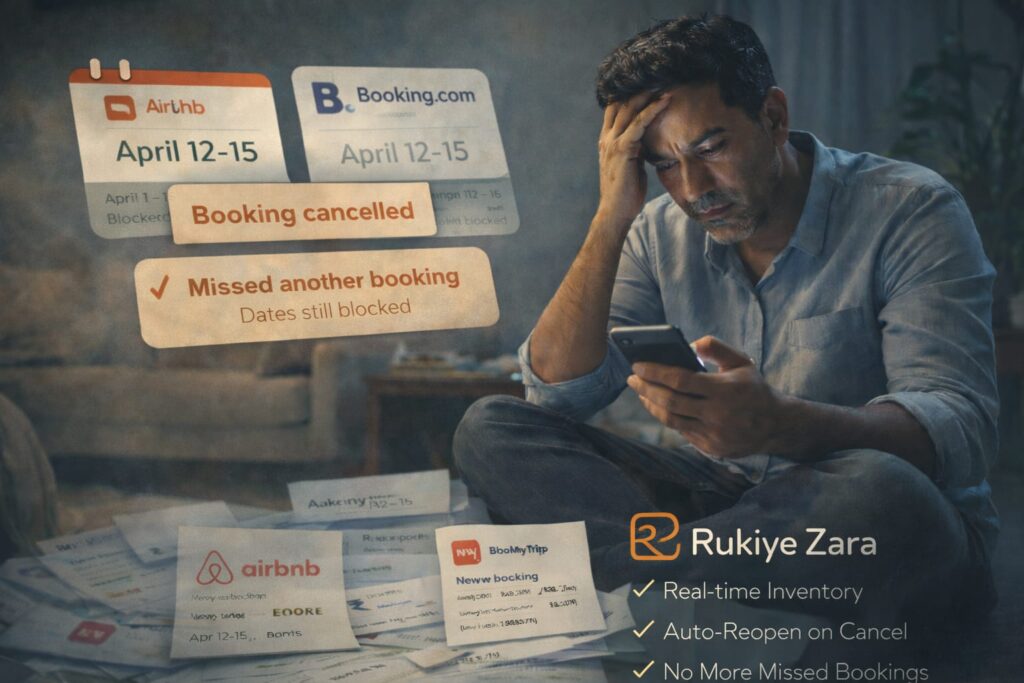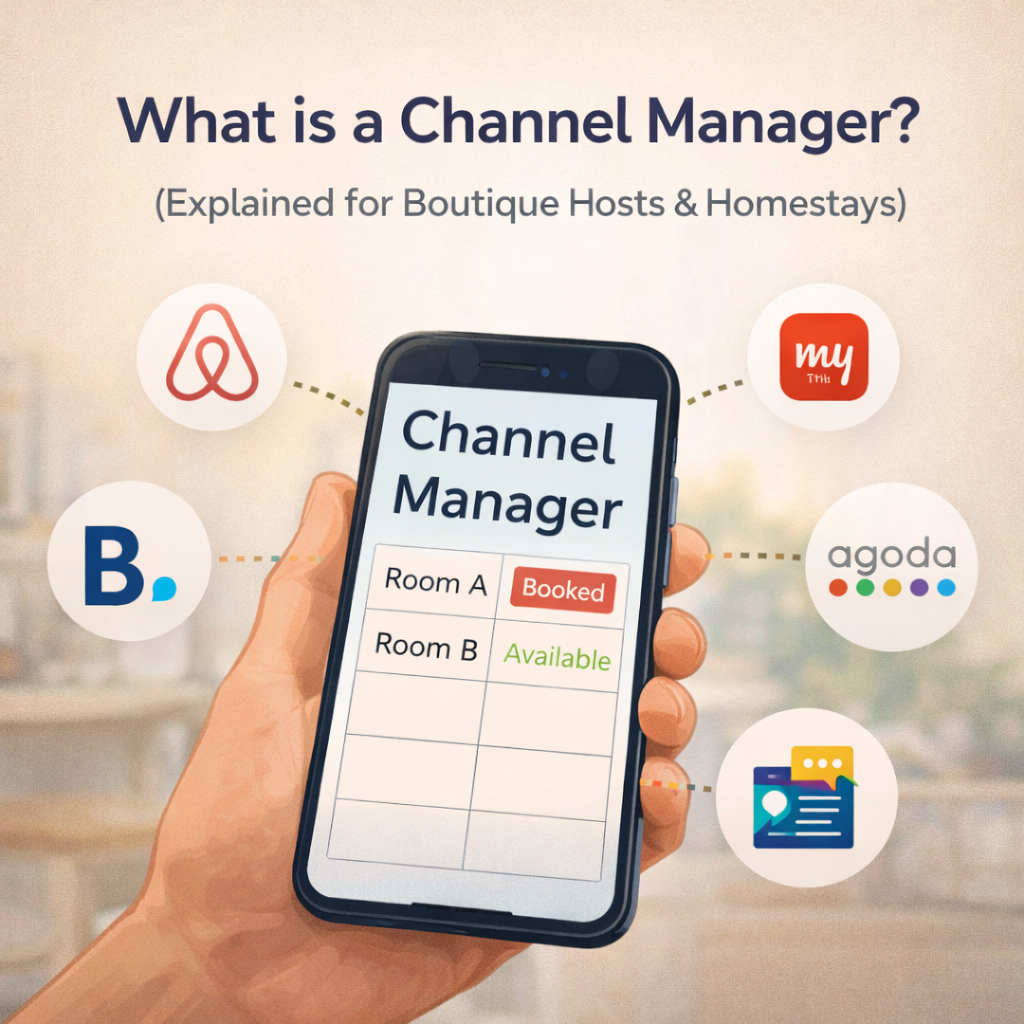Introduction:
Are you tired of feeling like you’re fighting a lone battle in the short-term rental world? If so, you’re not alone – literally thousands of individual hosts are struggling in isolation, trying to outsmart algorithms, slash prices lower than the neighbor, and wear a dozen hats (host, marketer, customer support, revenue manager, etc.) all by themselves. The truth is, the future of hosting doesn’t have to be solo. In fact, the smartest hosts are realizing that banding together can yield better results than going it alone. This post will explore why the one-host-show model is fading and how building a community of hosts – such as through the platform Rukiye Zara – can help you thrive. We’ll contrast the pains of “competing alone” on Airbnb with the power of a hosting community that has your back. Get ready to reimagine your hosting business from “me vs. the world” to “us vs. the market”!
The Problem with Flying Solo in 2025
Being an independent host can be liberating, but it also comes with heavy burdens, especially in today’s market:
- Algorithm Anxiety: Airbnb (and other OTAs) frequently tweak search algorithms. One day you’re on page 1, next day buried on page 5 for no obvious reason. Solo hosts often find themselves at the mercy of these opaque systems. Competing alone means you have zero influence over the platform’s whims. As a lone host, you can’t negotiate, you can’t call up Airbnb to change policy – you’re just one listing among millions. This lack of control is nerve-wracking.
- Race to the Bottom: We touched on oversupply in a previous post – markets like Delhi/Gurgaon have an excess of listings, causing hosts to drastically lower prices to compete. When you’re alone, it’s a race to the bottom. You end up in a pricing war with your neighbors, and nobody wins (except perhaps the guest who gets a cheap stay). A community approach could prevent this, but as a solo operator, you feel compelled to keep undercutting to stay visible. This is not sustainable for your earnings.
- Limited Marketing Reach: Large OTAs have millions of customers, but they also take a big cut and make you compete for attention. If you try to do your own marketing (like building a direct booking site, running ads, social media), it’s tough to gain traction alone. Google ads for travel keywords are expensive, social media requires constant effort. As a lone host, your marketing budget and bandwidth are minuscule compared to big players. So you either rely entirely on OTAs (with their costs and constraints), or struggle to generate direct traffic on your own.
- No Collective Bargaining or Support: When a guest causes trouble or a platform policy hurts hosts, an individual host’s voice is small. We’ve seen instances of policy changes (like Airbnb’s recent “anti off-platform” policy update) that worried many hosts rentalscaleup.com. Alone, you can’t do much about it. But as a group, hosts can push back or find workarounds. Similarly, on your own you don’t have fellow hosts to lean on for help with local issues, references, or even simple things like backup cleaning services when you’re in a pinch.
- Duplicated Efforts: Ten thousand individual hosts are ten thousand people separately solving the same problems – writing their house manuals, figuring out pricing strategies, setting up listing pages. There’s a lot of redundant effort. In a community or network, some of that can be centralized or shared (e.g., templates, best practices, pooled tools), freeing up each host’s time.
All these factors add up to what some are calling the “Airbnbust” for independent hosts – a sense that it’s becoming harder to succeed as a solo host due to macro changes. Rental scale experts note that the surge of supply on Airbnb, without comparable demand growth, has put existing hosts in a tough spot, with lower bookings per listing and heightened competition rentalscaleup.comrentalscaleup.com. That’s exactly what many of us have felt: our piece of the pie shrinking as more and more join the fray.
A telling stat from the Airbnb community: “For every 100 Airbnb properties, 88 of them did not have a guest… Oversupply of hosts is killing them.” community.withairbnb.com This was an exaggeration perhaps, but it underscores how many hosts are sitting empty at any given time because there are just too many listings. Competing alone in such an environment is a losing proposition. It’s like being one store on a street with 100 identical stores – you might get a few customers wandering in, but most will pass you by for no clear reason other than abundant choice.
Why Community and Collective Platforms are the Future
Imagine a different scenario: instead of 100 hosts operating 100 shops individually, those hosts form a cooperative marketplace – they pool their resources to attract customers to the street as a whole, and ensure each shop gets a fair shot and differentiates its offerings. That’s analogous to what a hosting community does. Here’s why being part of a host community or collective platform can turn the tide:
- Combined Marketing Power: When hosts band together on a platform like Rukiye Zara, they benefit from collective marketing. RZ, for instance, runs sponsored social media ads, Google ads, and partnerships to drive guests to the platform’s listings. As a member, your property gets exposure through these campaigns without you individually paying for it. The community essentially shares the cost and benefit of marketing. This is hugely advantageous – you’re leveraging a marketing budget and team far beyond your own means. Instead of each host spending ₹15k on mediocre separate ads, a platform can spend much more on high-impact campaigns that bring a wave of bookings for all.
- Shared Guest Network: A community platform can maintain a shared pool of guests who trust the brand. For example, a traveler who has a great experience with one Rukiye Zara home in Mumbai might next book an RZ home in Delhi. So one host’s excellent hospitality can lead to another host getting a booking (and vice versa). This inter-host referral effect does not happen when you’re on your own. Essentially, you’re benefiting from each other’s reputations under a common brand umbrella. Airbnb’s brand brings guests to the door, sure, but then it’s a free-for-all. A smaller community brand like RZ ensures that once a guest is in our world, they ideally stay within it for their future trips, benefiting all member hosts.
- Avoiding Oversupply Among Members: A well-managed community can implement supply control mechanisms. What does that mean? In Rukiye Zara’s case, they are selective in onboarding – they don’t just indiscriminately add every possible listing in the same area. They maintain quality standards and also balance the number of homes in a particular micro-market. This prevents the scenario of, say, 50 identical apartments in the same complex all undercutting each other. RZ might choose a few distinct ones to feature. By controlling internal supply, they ensure hosts aren’t tripping over each other on the platform. This is in stark contrast to Airbnb, which would happily onboard the 51st, 52nd, 100th host in an area because more listings = more fees for them. A host-centric community cares about host profitability, not just adding inventory. As a result, members enjoy better occupancy and pricing power.
- Collective Intelligence and Tools: In a community, hosts share knowledge openly. Tips for boosting occupancy, handling tough guests, local market insights – these flow freely among members instead of everyone guessing on their own. Moreover, the platform can provide centralized tools (PMS, pricing suggestions, cleaning services links, etc.) that everyone can use, saving each host from reinventing the wheel. It’s a scenario of “learn together, earn together.” When one host figures out a brilliant strategy, the others can adopt it through community forums or platform guidance. Rukiye Zara, for example, often circulates best practices and even organizes meetups or webinars for its hosts. That support system is invaluable and simply non-existent when you’re an independent host whose only “community” is maybe a Reddit group at best.
- Stronger Voice and Negotiation: There’s strength in numbers. If a platform representing 100 homes approaches a corporate for direct booking tie-ups, or negotiates a deal with a linen supplier, it has clout. Similarly, on broader issues like local regulations or pushing OTAs for changes, a host association or platform can advocate more powerfully than single hosts. Rukiye Zara, while not huge yet, is essentially an alliance of hosts – meaning it can act on behalf of all members for certain opportunities (e.g., getting bulk discounts on amenities, lobbying for fair homestay rules with authorities, etc.). Being part of such an alliance means you have a seat at the table in conversations that would ignore you as an individual.
- Focus on Hospitality, Not Just Hustle: Perhaps the biggest personal benefit: joining a community allows you to focus more on what you love – hosting and hospitality – and less on the grind of competition and marketing. When a platform like RZ handles the heavy lifting of marketing, distribution, tech setup, and even guest acquisition, you can dedicate your energy to improving the guest experience and managing your property. Many hosts got into this business because they enjoy welcoming guests or love sharing their space – not necessarily because they wanted to become SEO gurus or pricing analysts. A community platform relieves you of some “business hustle” duties so you can shine where it counts. And better guest experience = better reviews = more bookings, creating a positive cycle.
In summary, community = collaboration over competition. Instead of a thousand lone wolves all trying to snag the same prey, you have a coordinated pack with a game plan to ensure everyone gets fed.
Meet Rukiye Zara: A Community-Driven Platform for Hosts
So, how does this concept materialize in reality? Enter Rukiye Zara (RZ) – a pioneering hosting community platform in India that exemplifies the “stronger together” ethos. Rukiye Zara isn’t just another OTA; it’s a host-owned, host-centric platform built around the idea that individual hosts can achieve more by pooling resources and presenting a united front.
Here are some of the standout ways Rukiye Zara has hosts’ backs:
- Zero Listing Fees & Free Tools: RZ doesn’t charge hosts to list and even provides a free Property Management System. This means from day one, you have a professional system to manage your calendar, sync with Airbnb Booking if needed, and handle direct bookings – all at no cost. They’re removing financial barriers and tech headaches that solo hosts face when trying to set up their own direct booking infrastructure.
- Quality over Quantity: Rukiye Zara focuses on onboarding exceptional hosts and homes, not every host. They ensure each member meets certain quality standards (e.g., design, amenities, cleanliness). This benefits the community because the brand reputation stays high, and guests come to trust any RZ property. As a host, that means you’re in good company – you won’t be dragged down by a bunch of sub-par listings that turn off guests. Also, as mentioned, they avoid clustering too many listings of the same type in the same area. So your competition within RZ is minimal and healthy. They even have a policy of “supply control” where if an area is saturated, they might pause onboarding there or strategically choose which listings to promote, so everyone gets a fair chance.
- Unified Branding and Guest Trust: RZ markets itself as a collection of “well-designed, private, work-friendly homes” in.linkedin.com. The branding attracts a niche of guests who value those qualities. When a guest books via RZ, they know they’re getting a vetted home and a reliable host. Over time, many repeat guests just search within RZ because they prefer that consistent quality versus the mixed bag on broader OTAs. For hosts, this means if you uphold standards, you benefit from the community brand’s loyalty – guests might choose your listing because it’s on Rukiye Zara.
- Sponsored Ads & Demand Generation: RZ actively runs advertising campaigns (social media, content marketing, partnerships). For example, they might do an Instagram campaign targeting urban millennials about “ditch hotels, stay in a Rukiye Zara home next time.” As a solo host, reaching those eyeballs is hard, but RZ does it for you. Additionally, they sometimes collaborate with companies to house their employees or with event organizers for accommodation – deals that an individual host wouldn’t land alone. Your home could be discovered by guests through multiple channels, all orchestrated by RZ in the background.
- Dynamic Pricing and Revenue Management: While still community-centric, RZ isn’t shy about using tech. They provide guidance on pricing and even implement dynamic pricing suggestions across the network. This helps avoid the knee-jerk undercutting hosts do on Airbnb. Instead, pricing is adjusted smartly based on data (season, demand) so that hosts maximize earnings and don’t inadvertently start a price war amongst themselves. It’s like having a revenue manager for your property – a role an independent host usually can’t afford.
- Collective Initiatives to Boost Earnings: The community often comes up with creative ideas like cross-promotions (e.g., a Bangalore RZ host and a Goa RZ host referring guests to each other for two-leg trips), or festival packages (multiple RZ properties creating a Diwali special itinerary). These collaborative offerings can increase everyone’s bookings and are only possible when hosts coordinate under a unified platform. RZ facilitates these connections.
All in all, Rukiye Zara transforms hosting from a solo venture into a collaborative enterprise. You still own your property and your business, but you’re plugged into a larger machine that amplifies your strengths and covers your weaknesses.
Why “Us vs. the Market” Wins Over “Me vs. the World”
Let’s zoom out and appreciate the philosophical shift here. Traditional hosting on Airbnb felt like “me vs. the world” – you against countless competitors, arbitrary algorithms, and a fluctuating market. Stressful, to say the least.
The community model – as exemplified by Rukiye Zara – is more like “us (hosts) vs. the market”. It fosters a cooperative mentality where hosts are not enemies, but allies. Your true “competitors” become hotels or other accommodation options, not the host down the street who in another scenario would be vying for the same guest. By uniting, you change the competitive landscape entirely:
- Hosts gain market power: Instead of being price-takers (accepting whatever low rates the crowded market dictates), a unified host platform can be a price-maker to an extent, by differentiating product and targeting the right guests. For example, if RZ establishes a reputation for premium design homes, it can command higher rates from that segment of guests, rather than everyone undercutting to rock-bottom.
- Better Guest Experience: When hosts aren’t adversarial with each other, they can focus on making guests happy, not on sabotaging each other. A rising tide lifts all boats: if one RZ host delivers an exceptional experience, it reflects well on the brand and increases chance that guest uses RZ again (maybe at your property next). So everyone is incentivized to deliver quality, not just quantity. Contrast this with cutthroat OTA dynamics where some hosts might resort to iffy tactics to steal bookings (overpromising in listings, etc.), which hurts guest trust overall.
- Collective Earnings Growth: Instead of one host trying to maximize only their own occupancy at the expense of others, the community focuses on growing aggregate bookings which are then beneficially distributed. For instance, if corporate tie-ups bring 1000 room-nights of bookings, RZ can distribute those among hosts who opt in for business travelers. Everyone gets a piece. Alone, you might never tap into that segment. So, total pie grows and is shared, rather than infighting over a stagnant pie. This can actually increase your earnings beyond what you could achieve solo, not just protect what you have.
Conclusion: Join Forces and Thrive
It’s clear that the “Airbnb 1.0” era of hosts each fending for themselves is evolving. The next phase in the short-term rental space is host communities and platforms that emphasize collaboration over competition. Just as ride-share drivers formed cooperatives and small retailers joined marketplaces, hosts too are finding strength in unity.
If you’ve been feeling the strain of going it alone – the endless pricing battles, the marketing overwhelm, the isolation – it might be time to try a different path. Imagine having a community that has your back, where fellow hosts celebrate your success (because it’s their success too) and where a platform works to elevate your earnings, not just its own.
Rukiye Zara is leading this movement in India, and it’s a great place to start if you want to experience the power of community. By joining RZ, you’re not “signing up on another site” – you’re joining a host revolution that believes in win-win: when hosts win, the community wins, and vice versa. RZ provides the infrastructure, support, and network effects that an independent host could only dream of before.
Call to Action: Stop competing alone and start building together. If you’re in the Delhi, Gurgaon or any Indian market and want to boost your bookings without losing your sanity or slashing your rates to the bone, join Rukiye Zara today. Become part of a curated host community that will help fill your calendar, optimize your pricing, and market your property as part of a larger brand. Let’s face the market as a united front, not as scattered individuals. Together, we can achieve higher occupancy, higher profits, and a much more enjoyable hosting journey. 🚀
It’s time to rewrite the hosting playbook: ditch the solo act and embrace the power of community. When hosts have each other’s backs, there’s nothing we can’t overcome – be it algorithm changes, oversupply, or economic downturns. So, are you ready to stop fighting alone and start winning together? Join the community-driven future with Rukiye Zara and take your hosting to new heights!
Happy hosting, and welcome to the tribe! 🏡✨











